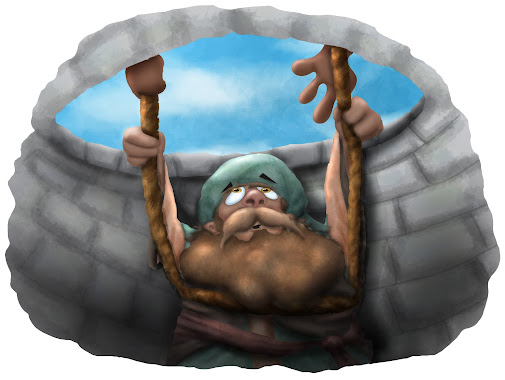Sometimes saying the right thing, or telling the hard truth is not easy. God says to do the right thing, not the easy thing. Just as Ebed-Melech risked his life, sometimes we have to risk being made fun of or losing friends. But know this. We always have God on our side when we do right.
So Jeremiah was saved..... well sort of. The king had Jeremiah brought before him. "Tell me what you know!" He ordered. Jeremiah was concerned that if he told him the truth, the king would have him killed anyway. But the king promised that he would not have Jeremiah killed if he told him the truth. So Jeremiah told the king that Babylon would soon attack Jerusalem, but that he should surrender peacefully to them or some bad stuff would happen to the king's family as well as to the king himself. The king was not happy with what Jeremiah said, but he had promised not to kill him, so he had Jeremiah tossed into dungeon.... again.
While Jeremiah was imprisoned, Jerusalem was taken over by the Babylonians, (just as God said) and the king of Judah didn't listen to what God said through Jeremiah. And remember what God told Jeremiah to tell the king... Some bad stuff would happen? Well the king tried to flee the city during the take over. He was caught and his eyes were gouged out! Also his wife and kids were killed in the palace when it was set on fire.
Even though Jeremiah was taken to Babylon during the siege, God protected him. Nebuchadnezzar, the king of Babylon set Jeremiah free to live in Babylon. Jeremiah was even given food and some gifts to help him settle in. Since Jeremiah was a prisoner of Judah, and the king of Judah was an enemy of Babylon, Nebuchadnezzar showed kindness to Jeremiah. So I guess getting thrown into prison again turned out pretty well for Jeremiah.
Sometimes things don't work out like we planned. I'm sure Jeremiah didn't want to be pulled from a well, just to get tossed into a dungeon. God sees all things. We need to trust Him. Have you ever had something go the wrong way, only to find out later that it was absolutely for the best? I have.
When Jerusalem was taken over by the Babylonians, a lot of the Jews were taken captive, however, the poorest Jews were left behind and a small governmental system was put in place. Many of the Jews saw that the fighting was over and returned to Judah. The Jews that fled to Egypt however, found life very comfortable there and decided not to return.
Jeremiah returned to Judah with a word for the people. He said that the people in Egypt should return as well. That Egypt would soon fall to Babylon just like Judah did. He said that the Jews that have remained in Egypt are now worshipping false gods. God said that He would pass judgement upon them and anyone else who is worshipping idols. Some of the new leaders did not like Jeremiah and what he was saying. So they captured Jeremiah and took him to Egypt.
While in Egypt, Jeremiah faithfully continued to speak the words that God had put in his mouth. The final 5 chapters of the Book of Jeremiah tell of God's judgement on Egypt, Moab, Philistine and neighboring countries. Jeremiah is not mentioned again in these final chapters. Some say he was killed, others say he escaped Egypt. No one really knows for sure.
So even though Jeremiah spent his whole life trying to get his people to turn from their sin and to turn toward God, the people never listened. The outcome was not in Jeremiah's hands. He simply did what the Lord asked him to do. That is called faithfulness. God delights in our faithfulness. We don't have to "save the world". That is God's job. All we have to do is obey Him, and leave the consequences to Him. If you tell someone about Jesus and they accept Him as their savior, God did that, not you. To Him be the glory! And on the same note, if the person you shared Christ with rejects the message, it's not on you. You did what God asked. Leave the rest to Him.




















